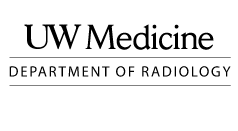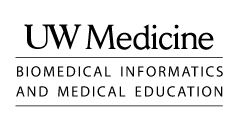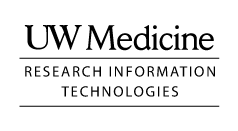Congratulations 2025 Pilot Award Recipients!
The University of Washington Institute of Medical Data Science is excited to announce the winners of the 2025-26 Pilot Awards. In its second year, this initiative aims to transform medicine and enhance public health through innovative data-driven approaches. Awardees were chosen from a wide range of applicants in fields such as informatics, computing, engineering, and medicine. The goal is for funded awards to spark new collaborations between computational science experts and providers.
Pilot funding for the period of July 1, 2025 to June 30, 2026, enables investigators to obtain preliminary data in order to establish a proof of concept and go on to seek larger grants. Investigators supported by the Pilot Program are working toward improving cancer predictions through AI, measuring ankle recovery progress, using machine learning to improve communication between health providers and patients, and improving the health of people with brain injuries.
Continue reading to learn more about their projects and join us at the upcoming IMDS Taskforce meeting, where awardees will further detail their approach for discussion.
Please join us in congratulating our awardees!
“Multimodal Data and AI for Uncertainty-Aware Prediction of Lung Cancer Treatment Response“

Stephen Bowen
Radiation Oncology

John Gennari, PHd
Biomedical Informatics and Medical Education

Faisal Yaseen
Biomedical Informatics and Medical Education (PhD student)
Treatment response in metastatic lung cancer can vary widely between patients, making it difficult for doctors to choose the best therapy. Although there are traditional measures for treatment response assessment and prediction, we hypothesize that accuracy can be improved by combining multiple types of data such as FDG PET/CT imaging, blood biomarkers, radiology notes, and clinical data. However, biomedical data science is hindered by a critical lack of high-quality, curated, and longitudinal multimodal datasets. This project aims to develop a high-quality, de-identified, longitudinal multimodal dataset and AI tools to predict treatment response with quantified uncertainty. This can help doctors and patients make more informed decisions and improve treatment planning for advanced cancers.
“AutoRELATE: Teaching Machines to Recognize Meaningful Connection in Clinical Encounters”

Andrea Hartzler
Biomedical Informatics and Medical Education

Barbara Lam
School of Medicine, Hematology, Oncology Division

Aishwarya Raj
Biomedical Informatics and Medical Education (PhD student)
Building strong patient relationships is essential for high-quality care, yet interpersonal communication is increasingly strained by time pressures, electronic health record distractions, and clinician burnout. Traditional communication skills training has had limited impact, and clinicians rarely receive actionable feedback in daily practice. Advances in artificial intelligence (AI) offer a timely solution through ambient communication assessment and automated feedback. Prior work has explored detecting “social signals” like warmth, empathy, and dominance from nonverbal audio cues. This project builds on that work by using large language models (LLMs) to assess similar signals in transcripts of primary care visits. Using a validated communication assessment framework, we will annotate transcripts and evaluate the ability of LLMs to predict communication quality. This work lays the foundation for AI-driven tools that support more patient-centered healthcare interactions.
“Quantifying Recovery After Ankle Injury to Advance Precision Medicine“

Katherine Steele
Mechanical Engineering

Cindy Lin
Rehabilitation Medicine

Ally Clarke
Mechanical Engineering (PhD student)
Ankle injuries impact millions of Americans with prolonged recovery, pain, and frequent reinjury. Yet, clinicians currently lack objective tools to monitor recovery in the community, identify patients at risk of re-injury, or personalize rehabilitation. This project aims to leverage smartwatch-based biomechanical monitoring and machine learning to track individual recovery trajectories. We will build personalized models of walking biomechanics and physiology from GPS-enabled consumer smartwatches. Post-injury activity data will be compared to pre-injury personalized or population models to quantify recovery rates and associations with clinical measures. The project combines Bayesian statistical learning with stride-by-stride analyses to monitor changes in stride length, heart rate, and respiration during activities of daily living. We hope that this partnership between engineering, sports medicine, and orthopedics will provide new tools for precision medicine by creating scalable, data-driven tools to support recovery and optimize outcomes in musculoskeletal care.
“Machine Learning-based Analysis of Auditory Signal Processing to Predict Extubation Failure in Patients with Severe Acute Brain Injury“

James Town
Department of Medicine, Pulmonary, Critical Care and Sleep Medicine

Shwetak Patel
Computer Science and Engineering

Alex Ching
Computer Science and Engineering (PhD Student)
Many patients with acute brain injury require intubation and mechanical ventilation due to loss of airway protective reflexes. Approximately 20% of these patients will fail their initial extubation and require reinsertion of a breathing tube within days. Failed extubation is associated with deleterious consequences such as hypoxemia and hypotension. Current prediction models and practices do not adequately identify which patients will fail extubation until too late. Earlier identification would alert clinicians to intervene and either prevent the need for reintubation or reintubate in a controlled manner. This project merges expertise in critical care medicine, wearable health sensor development and machine learning to build a sensor system worn by patients undergoing extubation to record their breathing sounds and process them via machine learning to identify signals associated with respiratory failure. This work will generate datasets of respiratory sounds from unique clinical settings and lead toward development of airway telemetry devices.
Thank You to Our Sponsors
A big thanks to the University of Washington School of Medicine, College of Engineering and School of Public Health for their partnership on this initiative. Additionally, we extend our gratitude to the UW Provost’s Office for their funding support and the eScience Institute for sponsoring cloud computing resources for our pilot teams.



IMDS is supported by the Schools of Medicine and Public Health, the College of Engineering and the Allen School for Computer Science and Engineering
